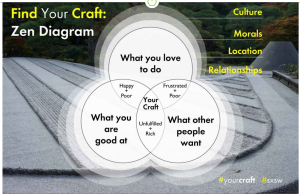The Fear and Creativity: Finding Your Craft discussion began with the differences between a job and a craft. The panelists defined a job as something you do to pay rent. They defined a craft as a way of expressing yourself through your work that is meaningful, has a positive impact on something or someone. Two very different definitions.
Over the past 10 years or so, the job world has greatly changed. Therefore, value is now defined differently, and people have a need for a deeper purpose because they are no longer defined by their job title or what they do. Each of the panelists had a different perspective on how they found their craft, along with a set of advice for the listeners who should be in search of their craft:
Adam Marelli : Artist and Explorer – Adam Marelli Photography
Marelli explained that he had a very long-winded journey before finding his craft as an artist. He always knew he enjoyed building and building for a purpose. He claimed that his first job in construction was his “shadow career”; it was a practical, safe money earning version of his craft. He learned how to build, but it was not the type he was seeking. After a long path of self discovery, Marelli has become a renowned photographer.
- Key message: There is value in looking at the world and providing valuable insight to what people can relate to
- Your craft is bigger than you
- You never know who is listening
- Aim to defy logic and reason
- Embrace your feelings
Jey Van-Sharp: Business Advisor and Strategist – MyUberLife
Van-Sharp believes that fear is the key to finding one’s craft. When you are in a fearful, or uncomfortable situation, you should know that you are on the right path. You shouldn’t always be comfortable. He also expressed that in today’s job market there are many valuable currencies outside of traditional money such as social and cultural currencies.
- Key message: Lean against your fear
- Embrace tension, reduce, organize
- Do the best you can, don’t always worry about perfection
Jim Hopkinson: Founder – Salary Tutor
Hopkins began his discussion with a quote by Leonardo da Vinci, “your views are ahead of your work.” Building off of this quote, he believes that you should become so good at your craft that those who you help appreciate you, as well as those they are surrounded by.
- Key message: Be so good at your craft that the client’s family thanks you
- Seek inspiration globally
- Make a resolution against fear
- Leave a legacy
The entire premise of this panel discussion was based off of the Zen Diagram which is pictured below; a much more detailed look at how you should determine your craft and career path.

